September was a landmark month for the FH Europe Foundation and its community—filled with advocacy milestones, inspiring events, and global collaboration. From the European Parliament to community health checks across Europe, momentum for cardiovascular prevention and patient-led change continues to grow.
Catch up on the key highlights from the September 2025 edition of the Heart Beat newsletter:
FH Europe Foundation News:
Ambassador Programme News:
News from our Research Projects:
Network & Partner News:
News from around the World:
Knowledge Hub:
Important dates you won’t want to miss!
On 25 September 2025, the European Parliament in Brussels became the stage for a decisive moment in the fight against cardiovascular disease. The high-level meeting, “Cardiovascular Prevention as the Cornerstone of a Competitive Europe – Scaling Up Lipid Screening to Secure Next Generations,” organised by FH Europe Foundation, was co-hosted by MEP Romana Jerković, Chair of the MEP Cardiovascular Health Group and rapporteur for the forthcoming EU Cardiovascular Health Plan, together with MEP Tomislav Sokol, EPP, member of the SANT Committee on Public Health.
The event marked ten years since FH Europe first brought the voices of patients to the European Parliament. A decade later, those voices are helping to shape policy. What began in 2015 as a plea for recognition of inherited lipid disorders has grown into a central pillar of Europe’s strategy to prevent cardiovascular disease and protect future generations. The occasion also provided an important platform to officially present the Brussels International Declaration on Lp(a) Testing and Management.
From Patient Appeals to Political Momentum
The meeting opened with a short film from 2015, a poignant reminder of the first FH Europe meeting in the Parliament and the perseverance of families who demanded action. Watch a video from the first EU Parliament event in 2015 here.
In her remarks, MEP Romana Jerković underlined that cardiovascular prevention is an investment in the next generation and in Europe’s competitiveness and highlighted the need for systematic lipid screening to be part of the EU’s future approach to cardiovascular health.

Patients and Youth Ambassadors at the Heart of the Story
The most compelling voices in the room came from the youth ambassadors and caregivers who live with the consequences of late or missed diagnoses.
Lena-Rosa Hanauer from Austria, also representing her national orgnisatin FHchol Austria, Joanna Kacprzak from Poland, Aedan Kaal from the Netherlands and Teevi Poobus from Estonia shared deeply personal stories that revealed the cost of delayed detection and the difference that timely screening and treatment can make.
Their testimonies transformed statistics into lived experience, a reminder that policy decisions directly shape lives. Their intervention underscored an urgent truth: preventable losses of time, health and life can no longer be tolerated, and patients and caregivers must guide the shaping of cardiovascular strategies.

A Decade of Progress Driven by Patients
Magdalena Daccord, CEO of FH Europe Foundation, traced the journey from a grass-roots NGO to a respected international partner for health policy change. She highlighted milestones that turned advocacy into policy: the EU Best Practice recognition of FH paediatric screening, the Prague Declaration (2022) on screening children for FH, and the Brussels International Declaration (2025) on Lp(a) testing and management.
Her message was clear and determined: the next decade must be about implementation, turning knowledge and commitments into action to prevent the preventable.
Turning Political Recognition into Action
Kitti Almer, Policy and Advocacy Manager at FH Europe Foundation and the former Health Attaché and Chair of the Public Health Working Party under the Hungarian Council Presidency, pointed to a decisive step forward: the Council Conclusions on Cardiovascular Health adopted in December 2024 , which for the first time identified FH and elevated Lp(a) as EU-wide priorities for early detection and prevention. She stressed that this progress now needs to be translated into national-level action plans under the forthcoming European Cardiovascular Health Plan. Learn more about the council conclusions here
MEP Tomislav Sokol highlighted the European Parliament’s duty to ensure that the political momentum of recent years results in binding commitments, funding and equitable implementation across all Member States. He framed prevention as both a moral imperative and an economic necessity, central to Europe’s competitiveness and resilience.

The Scientific Case for Early Prevention
The scientific sessions provided compelling, data-driven evidence that prevention works, and pays off.
Adding a crucial economic dimension, Professor Zanfina Ademi of Monash University and member of the Lp(a) International Taskforce, presented evidence that screening for FH and Lp(a) is not a cost burden but a preventive investment. Drawing on studies from the Netherlands and Australia, she showed that cascade screening and early treatment of children with FH increase life expectancy and reduce long-term costs, with every euro invested in the Dutch programme returning over €8 to the health system. Her analyses also found that Lp(a) testing is cost-saving in high-income countries from both healthcare and societal perspectives, strengthening the case for routine testing as part of prevention policies.
Professor Børge Nordestgaard of Denmark, President of the European Atherosclerosis Society, reminded participants that cardiovascular disease still causes one-third of all deaths in the EU, despite being largely preventable with modern therapies. He provided a very easy to follow overview of all four lipid disorders which were at the centre on the day, and called for earlier and broader screening, including during childhood vaccination visits and in adults at risk, and emphasised that “CVD in FH is 100% preventable using statins.”
Professor Albert Wiegman of the Netherlands, Trustee of FH Europe Foundation and a world-famous paediatric cardiologist specialising in inherited lipids disorders, , presented decades of evidence showing that early diagnosis in childhood dramatically reduces premature heart attacks. He described the Prague Declaration on FH screening as a “North Star” for health leaders, a guide showing that paediatric screening is lifesaving, cost-saving and equitable. showing that paediatric screening is lifesaving, cost-saving and equitable. Find the Prague Declaration lay version here
Professor Florian Kronenberg of Austria, a renown geneticist specialising in lipoprotein (a) and Chair of the Lp(a) International Taskforce, presented the challenge of Lp(a), noting that one in five people has elevated Lp(a) yet only 1–2% have ever been tested. He warned that high Lp(a) greatly increases the lifetime risk of heart attack and stroke and urged EU and national leaders to integrate Lp(a) testing into routine cardiovascular risk assessment. assessment. Find the Brussels Int. Declaration lay version, launched at the event, here

Innovation Driving Change
A session dedicated to innovation showcased how EU-funded projects – PERFECTO, PerMed FH and FH-EARLY – are combining genetics, artificial intelligence, behavioural science and patient co-design to close detection gaps and deliver practical, scalable models of care.
In a video address, Professor Fausto Pinto of Portugal, coordinator of FH-EARLY, underscored that “Innovation is not abstract. It is concrete, collaborative and actionable.” These projects are already influencing national activities and screening policies in Romania, Cyprus and Bulgaria, proving that European collaboration can translate scientific advances into tangible benefits for patients. Furthermore, they provide clear innovative and scalable solutions addressing personalised communication as presented by Dr Marius Geanta, founder and President of InoMed, cheaper and faster genetic testing which will improve personalised prevention by offering precise diagnosis and personalised management protocols as highlighted by Professor Mafalda Bourbon from Portugal, coordinator of PerMed FH consortium and the mastermind behind FH-EARLY's chip array solution. And the proofs are already visible, for example in Cyprus, where FH screening is being enhanced by implementing the personalised communication model as explained by Prof Andrie Panayiotou, President of the Cypriot Atherosclerosis Society and partner in PERFECTO FH consortium.

Collective effort
The event was endorsed by key leaders in the cardiovascular health and lipid field. FH Europe invited the European Alliance for Cardiovascular Health (EACH), the European Atherosclerosis Society, the International Atherosclerosis Society, and the Global Heart Hub to join the event and support the call by endorsing the meeting.
The meeting was made possible thanks to the support of the life sciences community, including Novartis, Amgen, MSD, Chiesi, Servier, and Menarini.
A special thanks goes to our moderator, Mădălina Iamandei, EU Affairs Director at the DGA Group and FH Europe’s most recent Ambassador, who skilfully guided the discussions and ensured all voices were heard.
A Shared European Responsibility
The meeting closed with a united call from the MEP hosts and patient leaders for political courage and national-level implementation, so that early detection and equitable access to treatment become the standard across Europe.
The discussion made one thing unmistakably clear: the forthcoming European Cardiovascular Health Plan can only succeed if it keeps patients’ needs and experiences at its core.
Ten years after FH Europe’s first meeting in the European Parliament, the organisation has shown how patient voices, united with science and political leadership, can transform public health policy. The next decade must deliver on the promise to “prevent the preventable” – protecting the hearts and futures of millions of Europeans.

The full report of the event will be shared soon.
Prepared by

Kitti Almer
FH Europe Foundation Policy and Advocacy Manager
On this year’s World Heart Day, nearly 300 participants came together online for a landmark EU Cardiovascular Health Plan stakeholder webinar, underscoring both the urgency and momentum for coordinated European action. Cardiovascular diseases (CVDs) remain the leading cause of death in Europe, claiming over 1.7 million lives each year and costing the EU about €280 billion annually.
The webinar’s timing could not have been more symbolic – and more practical. The European Commission is preparing the first-ever EU Cardiovascular Health Plan (CVH Plan), aiming to emulate the success of Europe’s Beating Cancer Plan with a comprehensive approach spanning prevention, early detection and screening, treatment, care, and rehabilitation – while also tackling cross-cutting priorities like research and innovation, digital health and AI, and health inequalities.
In a special video address, Commissioner Olivér Várhelyi highlighted that CVDs remain a “shared European challenge” and that this plan will help Member States coordinate efforts. He stressed that the initiative builds on the EU’s ‘Healthier Together’ programme and will link cardiovascular health with related areas such as diabetes and obesity.
A major focus will be on comprehensive cardiovascular health checks, powered by digital and AI-driven tools, to identify people at risk earlier and offer timely interventions. Várhelyi also underscored the importance of reducing inequalities across Member States and between different population groups.
This was not FH Europe Foundation’s (FHEF) first encounter with the Commissioner. FHEF team, together with Prof. Florian Kronenberg met with him on 18 September in Brussels, ahead of the webinar, to emphasise the importance of integrating inherited lipid disorders into the EU response to cardiovascular diseases.
“By working together, we can improve heart health for everyone,” Commissioner Várhelyi concluded, inviting all stakeholders to help shape and later deliver the plan.
Read more about the meeting with the Commissioner here.
Marianne Takki, representing DG SANTE, presented the European Commission’s current thinking and shared insights from the ‘Call for Evidence’ consultation, which ran from 11 August to 17 September and attracted 677 responses – with a strong 87% coming from EU Member States.
Ms. Takki highlighted that the consultation validated the Commission’s initial priorities:
She also stressed that health inequalities remain a core concern, with cardiovascular mortality rates up to seven times higher in some Member States. Ten countries already have national cardiovascular health plans, but more support is needed to close the gaps.
Research and innovation will play a crucial role in bridging knowledge gaps and translating findings into practice. EU investment in CVD-related research through Horizon 2020 and Horizon Europe has already reached €1.4 billion, with new opportunities on the horizon to address links between nutrition and cardiovascular health, as well as innovative care models.
Find the slides official slides from the webinar here.
The consultation and the webinar itself demonstrated how vibrant and committed the CVD stakeholder community is. Contributions came from patient organisations, clinicians, researchers, industry, and advocacy groups, all calling for bold and practical solutions.
Magdalena Daccord, CEO of FH Europe Foundation (FHEF), took the floor to represent the 90 million citizens in the European Union affected by inherited lipid disorders and related conditions. She emphasised the need to ensure that familial hypercholesterolaemia (FH), elevated lipoprotein (a) [Lp(a)], homozygous familial hypercholesterolaemia (HoFH), familial chylomicronaemia syndrome (FCS) and other inherited lipid disorders are explicitly addressed in the plan – both as a genetic risk factor for early-onset CVD and as a field where early screening and detection saves lives. She also raised the importance of tacking genetic discrimination when implementing early screening and detection.
FHEF, together with consortia PERFECTO FH, PerMed FH, FH_EARLY, and the Lp(a) International Taskforce as well as many FHEF Network patient organisations and individual patients, young ambassadors and experts also provided extensive feedback during the public consultations, ensuring that the voices of patients and their families were heard loud and clear.
Read the FHEF Response to the EC Consultation on CVH Plan for Europe_2025 here.
Many other stakeholders echoed complementary priorities:
The EU Cardiovascular Health Plan is expected to be finalised by the end of the year, informed by the rich input gathered through consultations and this webinar. The Commission has committed to working closely with Member States, stakeholders, and patients to ensure that the plan is comprehensive, equitable, and actionable.
For FHEF, the webinar marked another milestone in ongoing advocacy to ensure that inherited lipid disorders and early screening combined with family-based screening are fully integrated into the EU response to cardiovascular health challenges.
As the world marked World Heart Day, this discussion served as a powerful reminder that better heart health is not just a medical imperative – it is a societal commitment.
FH Europe Foundation remains dedicated to ensuring that the patient voice continues to guide this journey – from Brussels to every community across Europe and beyond.
Prepared by

Kitti Almer,
FHEF Policy and Advocacy Manager
Additional resources:
On 24 September 2025, FH Europe Foundation led a powerful, cross-border movement to raise awareness of familial hypercholesterolaemia (FH). With more than 260 downloads of the toolkit materials, and key visuals, translated into several languages, this year’s campaign was greatly supported by our Ambassadors, Network Members, Partner Organisations and many others as well. From social media awareness campaigns to local screening activities and international webinars, our global community came together to amplify one vital message: early detection saves lives.
Harnessing the strength of our network, Ambassadors and healthcare partners, FH Europe Foundation spotlighted the difference between common high cholesterol and inherited FH. Together, we engaged families, clinicians and policymakers to #PreventThePreventable and work towards a healthier future.
FHchol Austria launched an FH Awareness campaign via the info screens on Vienna’s public transport. From Monday to Friday in FH week, a 5-second spot combined either with a question and answer or with a quiz was shown every 15 minutes on the information screens of the buses, tramways and in certain underground stations. With this initiative, FHchol wants to raise awareness among the people who use public transport on their way to work, home or wherever.
The Belgium Heart League marked FH Awareness Day within the framework of its national Heart Week campaign (22–29 September 2025). The initiative launched with a press conference on 22 September and featured over 40 activities across the country, engaging hospitals, municipalities, and social welfare centres. These events promoted awareness of cardiovascular risks, with a special focus on patients with congenital cardiopathies and the importance of early screenings.
As part of the campaign, the League released dedicated videos available here and will also publish a special edition of its magazine Coeur et artères (Q4) on cholesterol as a key cardiovascular risk factor. More details about Heart Week 2025 can be found on the Belgium Heart League website.
This year, the Czech Republic celebrated the 10th anniversary edition of FH Week, officially linked to World Heart Day. The programme included education in companies and institutions, lectures, and cholesterol testing. Since 2015, FH Week has helped identify 50 new families with FH. Each year, a new activity has been added: last year it was Lp(a) testing and awareness-raising, while this year it featured additional education on obesity and flu vaccinations at two locations, supporting older adults and those with chronic cardiovascular disease.
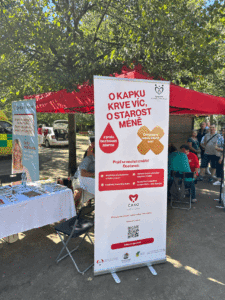
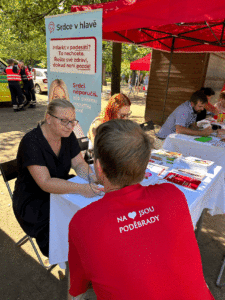
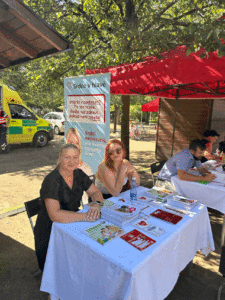
LDL Greece marked International FH Awareness Day with TV and radio interviews highlighting the importance of paediatric screening. The campaign raised public awareness of inherited high cholesterol, often called a “silent” but treatable threat. Watch the interviews here (in Greek).
ParSirdi.lv geared up for FH Awareness Day with a series of impactful activities designed to inform and engage both the public and the medical community. Their team prepared a focused educational campaign across social media channels, including the use of our FH Awareness Day toolkit that also supported Latvian translations this year. They adapted the resources and rolled out the campaign on a national level! To further amplify their message, ParSirdi.lv sent out a press release and participated in targeted TV and radio programmes, ensuring FH Awareness reached an even broader audience across Latvia.
The highlight of their efforts this year is the celebration of the 10th anniversary of the Latvian FH Patient Registry. On September 24th, ParSirdi.lv hosted a special gathering for FH patients and healthcare professionals. The event showcased the achievements of the registry, offered educational and motivational talks for patients, and provided a forum for open discussion on the topics that matter most to those living with FH.
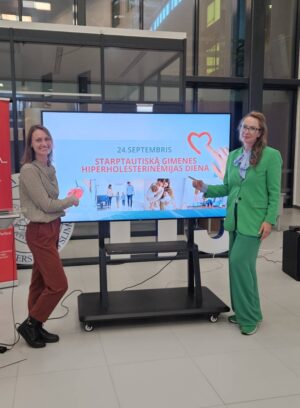

To mark FH Awareness Day and World Heart Month, the Croí Mobile Health Hub visited Queen Maeve’s Square, Sligo, on 24–25 September 2025, offering free cholesterol, blood pressure and heart health checks. The state-of-the-art mobile unit, the largest of its kind in Ireland, also hosted CPR demos and education sessions. The event encouraged the public to take proactive steps for prevention while spotlighting FH and the urgent need for stronger national cardiovascular policies.
Although FH CARE Singapore did not organise a standalone FH Awareness Day event this year, they placed a strong emphasis on forging meaningful partnerships and boosting outreach for familial hypercholesterolaemia awareness. Their activities marked the occasion with significant impact, focusing on collaboration, education and systemic improvements in FH care.
In partnership with the Singapore Heart Foundation, FH CARE Singapore contributed to the high-profile Go Red for World Heart Day campaign, ensuring that FH was included in the broader conversation on cardiovascular health. This collaboration helped spotlight the importance of early detection and treatment of inherited cholesterol conditions for both the public and professionals.
They also reached out directly to the healthcare community with an email campaign to all staff at Khoo Teck Puat Hospital (KTPH), encouraging greater awareness and engagement among health professionals.
In parallel, FH CARE Singapore supported the launch of the Singapore National Programme for Genetic Testing for FH—a milestone step forward for early diagnosis and improved care for individuals and families at risk.
Through these efforts, FH CARE Singapore demonstrated their ongoing commitment to advocacy, partnership and awareness. Even without a dedicated FH Awareness Day event, their initiatives made a meaningful contribution to advancing FH care in Singapore.
The recent IAS/EAS joint session in recognition of FH Awareness Week was a remarkable event, featuring a recorded session from EAS 2025 in Glasgow. This webinar provided key insights into FH diagnosis, treatment, and global strategies, making it an invaluable resource for those involved in the field.
A highlight of the session was the participation of FHEF’s HoFH Patient Ambassador, Marwa Sadik, who shared her perspective on family planning and joined the live panel discussion. Her contribution added a unique and personal dimension, bringing the patient voice into the conversation.
The discussion was further enriched by Professor Kirsten Holven (also a member of FHEF’s Scientific Advisory Board) and long-standing supporter Professor Gerald Watts, with moderation by Professor Marianne Benn. Together, they ensured a lively and engaging exchange.
Marwa's participation in the webinar and panel discussion exemplifies the active involvement of our ambassadors in raising awareness and sharing their experiences. Their contributions are invaluable in helping to shape the future of FH treatment and support.
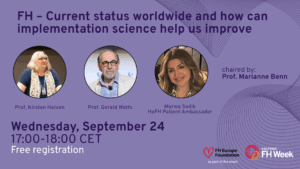
On FH Awareness Day, FH Europe Foundation partnered with M42 Academic Affairs and Dr Sarah Qureshi to host a special webinar endorsed by the International Atherosclerosis Society (IAS). Entitled “FH: Where Family and Heart Meet — Early Detection and Treatment in Familial Hypercholesterolaemia”, the session brought together healthcare professionals and patients in the UAE and beyond.
Speakers included Dr Wael Al Mahmeed and Dr Sarah Qureshi (regional perspectives), Professor Albert Wiegman and Magdalena Daccord (global insights), and patient Ambassador Chyrel Lichaa from Lebanon, who shared her powerful personal story. Their contributions highlighted the importance of early detection, effective treatment, and patient advocacy in driving better care.
Through expert insights and shared experiences, the event underscored the need for stronger international collaboration and community support for those living with FH and HoFH. Read more about the webinar here.
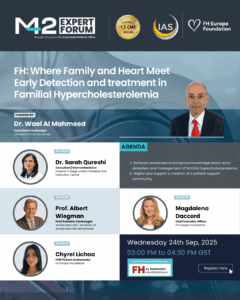
Active spreading awareness about FH Awareness Day and FH on social media
We are grateful to our Ambassadors for actively raising awareness of FH Awareness Day on social media. Using the dedicated photo frame, multilingual messages and resources from our toolkit, they helped amplify the campaign and ensured our message reached communities worldwide.
The EAS FH Week 2025 (22-26 September) shone a spotlight on the urgent need for better FH diagnosis and care. Marking the 10th anniversary of the EAS FH Studies Collaboration (FHSC), milestones from 76 countries and over 80,000 FH patients were showcased. Highlights included FHSC achievements, new research, advocacy at the European Parliament, a webinar with patient voices, and new initiatives for paediatric care and lipid clinics.
FH Australia held seven community awareness events across the country from 22–26 September 2025. The events highlighted inherited high cholesterol conditions—FH and elevated Lp(a)—and stressed the importance of early detection and treatment. Activities included free cholesterol checks, family heart health discussions, and resources for patients, families, and healthcare professionals. A social media campaign further amplified awareness. For more info: fhaustralia.org.au.
FH China marked a milestone on FH Awareness Day by hosting its very first patient meeting, an empowering event raising awareness about FH, including its rare and severe form, HoFH.
FH Europe Foundation was honoured to support the initiative. CEO Magdalena Daccord delivered a message on behalf of the international community, emphasising shared commitment to collaboration and addressing unmet needs in FH care. Anna Andrea Böhm from FHchol Austria also joined, promoting cross-border dialogue and unity.
The energy at the meeting was palpable. “Our meeting today concluded successfully—everyone really enjoyed it, and there was a lot of lively interaction on site. Many attendees expressed surprise and appreciation for the remarks from the international patient organisation, and gained valuable insights into what your organisation is focusing on and striving for. Thank you so much for your support!” shared Nazhen Chen, founder of FH China.
Our partnership with FH China began in 2024 and has continued to grow, fuelled by a shared vision to empower patients and strengthen advocacy. This milestone is just the beginning of many more joint projects, building bridges across borders and fostering a truly global FH community.
As we reflect on the success of FH Awareness Day 2025, we look ahead to the next chapter in cardiovascular advocacy. FH Europe Foundation continues to drive policy change through initiatives like the Prague Declaration on FH Paediatric Screening, which calls for systematic implementation of FH paediatric screening across Europe.
On 25 September, our Ambassadors and experts gathered at the European Parliament for a high-level event focused on scaling up lipid screening across Europe. This milestone builds on a decade of advocacy and sets the stage for the forthcoming EU Cardiovascular Health Plan.
We have submitted our recommendations to the European Commission´s CVH Plan, urging recognition of inherited lipid disorders as major risk factors. Now, we invite all stakeholders to endorse our submission and help shape a future where no one is left behind.
Together, we move from awareness to action. Thank you for being part of this journey.